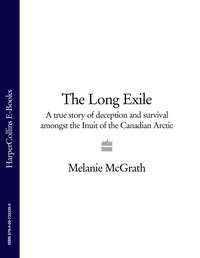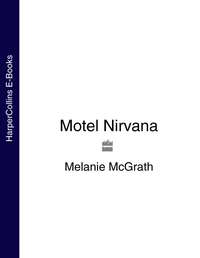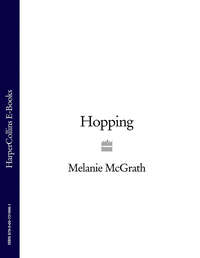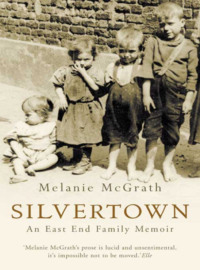
Полная версия
Hard, Soft and Wet

HARD, SOFT & WET
the digital generation comes of age
MELANIE McGRATH

Dedication
for Alex and Daniel
Epigraph
‘I could tell you my adventures – beginning from this morning,’ said Alice a little timidly; ‘but it’s no use going back to yesterday, because I was a different person then.’
LEWIS CARROLL,
Alice’s Adventures in Wonderland
Contents
Title Page
Dedication
Epigraph
Prologue
I: In Wonderland (CALIFORNIA)
II: Home & Away (LONDON)
Intermission (WIREDWORLD)
III: Lost in Space (SAN FRANCISCO, BOSTON, NEW YORK)
IV: Bonjour Tristesse, or The Unforgiven (ICELAND, ENGLAND, WALES)
V: Through the Looking Glass (BERLIN, PRAGUE, MOSCOW, SINGAPORE)
Keep Reading
Acknowledgements
Author's Note
About the Author
Copyright
About the Publisher
I: In Wonderland
THERE’S NO EXPLAINING why Nancy and I have stayed friends over the years. We don’t have much in common any more. Not much you could put your finger on. But friends we are, strung together by our few similarities and by the thin, tough mesh of our small shared past.
The airport train unzips to let a couple out, then zips back up and hums away from the station, picking up speed and rediscovering its riff. Beating out the same syllables on its tracks: Am-er-i-ca, Am-er-i-ca. A squall of tunnel air scatters them. Am-er-i-ca. Am-er-i-ca. It’s been fourteen years since I first stepped out of the plane at San Francisco. Now I’m going back. Nancy will be standing at the barrier on the other side waiting for me. Nancy with the troublesome eyes, the air of insouciance, the panoramic humour. Nancy of the good dream.
Out on the other side of the tunnel the rhythm tugs on, a restless, sexy hiss of noise. Am-er-i-ca. Am-er-i-ca. Mad, fat, brave America. Am-er-i-ca. The sound of redwoods big as mushroom clouds, of cream soda cans trapped in cooler bags, of blanket smog tricked out as coastal cloud. Am-er-i-ca. A sway of pricking notes, like liquorice powder on the tongue.
We met in a borrowed apartment on Venice Beach. She was a couple of years older than me, nineteen I think, but assured and at home in herself even then. I thought she was the girl from Ipanema on loan to Los Angeles; tallish, with a swing of a walk and sharp brown hair. We watched TV together, roaring at the re-runs of The Partridge Family and after we were done laughing, we skipped down to the beach and played. She dazzled me. I hung on her words and practised their pronunciation. Bayzil, leeshure, parsta, lootenant. We had all the usual Anglo-American spats, who came first at what.
Later, Nancy’s brother saw me off at the Amtrak station and promised to catch up with the train on his motorbike at Santa Barbara or thereabouts. The last I saw of him, he was standing in a field next to the track, waving and smiling as the train sped by, too fast for him to be able to make out my carriage or me. He moved to Canada some years later, but I was always touched by that gesture. I was seventeen and everything was ripe with meaning.
SAN FRANCISCO, CALIFORNIA, TUESDAY
Apple pie
Nancy was there at the barrier as I’d expected, her hair shorter and still beautiful, with tracings around the eyes. We rumbled along highway 280 into San Francisco, past the industrial centre, past the university and down into 19th Avenue, chirping like caged birds, our heads darting about and our tongues full of this and that. The city was looking just so in the afternoon sun.
‘When Brezhnev came, he asked if people had to pay an extra tax to come and live here,’ said Nancy.
‘Well it’s not cheap.’ We’d already stopped off for a long shot of latte. I’d noticed the prices of a few things.
‘No, but it’s pretty.’
And with the broad light showing off the pastel-coloured porches and bougainvillaea flowers strewn along 19th Ave, it was pretty. Fine and pretty.
As we crossed the Golden Gate Bridge I turned in my seat so as not to miss the view of the Bay with the Transamerica building shining like a chunk of Toblerone still wrapped in its foil and the rocky bubbles of Alcatraz and Angel Island. Coit Tower was murky red against the haze with Pacific Heights and Nob Hill behind and North Beach at the other side, the lot piled up against the hills as rumpled as a plate of pastel berries, or maybe a volcano cast in scumble glaze. I began to smile. The car tyres continued tocking over the metal stress bars of the bridge while Nancy and I fell silent and happy.
At Strawberry Point we dropped down onto the slip road and lost sight of the city. Fuddled with pride, Nancy turned to me and said in a choked-up voice:
‘Shall we get something to eat?’
‘Yeah,’ I replied in an instant. ‘McDonald’s apple pie.’
And now it is the middle of the Californian night, and I’m sitting on the bed in Nancy’s spare room listening to the crack of the cedar shingles and the distant mechanical blur of traffic running along the Golden Gate Bridge and into the Waldo tunnel. A sweep of light from a passing car flares against the books pinned up about the room. Four shelves on the history of science, two more on computing, a small collection of modern novels, software guides and a couple of teach yourself programming manuals, all smelling of must and chemicals.
Somewhere below the house, at the water’s edge along the rim of shingle, a nightbird caws.
America. Here I am once more.
FRIDAY
By the time I wake Nancy has left for work. A note in her familiar hand lies on the table:
‘Sweetheart. I’ll be back early so we can go for a walk in Muir Woods, OK?’
Muir Woods is my favourite spot in the whole of Northern California. It is where the Spanish moss hangs from the branches of thick red trees as old as gunpowder.
Over the past couple of years Nancy has been marketing software for a company in Marin. We’ve never spoken about it much. Our friendship isn’t based on long shared experience, but on some intangible, timeless affection. Whenever I think of my friend, I am haunted by those impressions of her that were first imprinted on my memory when I was seventeen. Sunny brown hair, a restless air and a wide confident swing. We don’t have to know much about the everyday run of one another’s lives, to love one another all the same.
Down in Strawberry Village at lunchtime my eye is drawn to the ‘$3.99 high-tech burrito special’ on offer at the local taqueria. A regular-looking burrito arrives: flour tortilla, beans, cheese, shredded lettuce, sour cream on the side.
‘What’s the high-tech part?’ The waiter looks at me darkly.
‘I don’t know, lady.’
He fills up my glass so hard that waves of iced water explode from the rim and wet the table.
Along one of the main trails in Muir Woods, just beyond the visitor centre, there is a slice of redwood tree with its age rings marked out in years of human history. Christopher Columbus’ discovery of America is marked on a ring about three-quarters of the way in, the Declaration of Independence is three-quarters of the way out and the American Civil War is so new that it’s almost set into bark. Each time Nancy and I have been out to Muir Woods together we’ve had the same conversation standing in front of that piece of tree. It’s a ritual. Nancy says something like: ‘Look at the huge gaps between markers until you get to the twentieth century, which is all backed up, like more has happened in the last hundred years than in all the other centuries combined.’ And I generally reply with some platitude like: ‘Yeah, it makes you think, doesn’t it?’
Dry weather has brought up the dust in Muir Woods, thickening the stems of bright sun bursting through the trees. A few jars wheeze under the canopy and the air is big in stillness.
‘This place feels like a contradiction of America,’ I say, as we meander along the river bank towards the mouth of the canyon. ‘So quiet, untouched.’ A small shadow falls over Nancy’s face. She stops in her tracks, gazing at the sky as though reading some message from an aerial autocue.
‘But this is exactly America,’ she says. ‘The America of the first frontier.’ She flips an insect from her arm. ‘Northern California is the one place where the old and new frontiers collide. It’s at the epicentre of every dream America ever had. The old frontier,’ she waves at the trees, at the key of light through the leaves, ‘and the new frontier a few miles down the road in Silicon Valley. The high-tech frontier of chips and virtual worlds.’ We wander on a few paces, locked in thought.
‘All those books in your spare room,’ I begin. Nancy waves the question away.
‘I haven’t read them all. I’m trying to keep up is all.’ She returns to her own bright thoughts. ‘You know, the first frontier was never some fixed thing. It was kind of mutable. First it was the Appalachians, then the Missouri, the Great Plains, then the Rockies. It’s the same with high tech. There isn’t a single technological frontier. The minute one boundary is crossed, the dream moves on.’
We stop at a tangle of furze marking the mouth of the canyon and prepare to turn back towards the visitor centre past the slice of redwood tree. I’m wondering why I chose to come to America now, with nothing particular to do and nowhere particular to go. I’m thinking that somehow, subconsciously, I must have sensed a new beginning here. And I must have felt the need to join in the game, to stake out some territory that might fill up the empty hours and the meaningless, shifting days of my adult life.
‘You know, Nance, I’d really like to be in on this new frontier, if that’s what it is. Will you teach me?’
‘Sure. I thought that was why you came.’
‘I don’t know why I came,’ I say, laying down part of the truth. ‘I just wanted to be in America.’
After supper, Nancy introduces me to her clippings box and pulls out a copy of an article she cut from some magazine a few months before.
‘What I love about all this high-tech stuff’, she says, handing me the paper, ‘is that no one really knows how the hell it’s all gonna turn out.’
The article is a list of all the technological predictions ever made in print. Marconi prophesying that radio would only be used for telegrams ship to shore, Alexander Graham Bell supposing the phone was destined for nothing more than piping concert music from one place to another. And in 1977 the Chairman of Digital Equipment Corporation saying: ‘There is no reason for any individual to have a computer in their home.’
MONDAY
Nancy is back at work, leaving me time to think about the days just gone.
I spent much of the weekend taking my first frail steps along the technological frontier in Internet Relay Chat. Nancy said she’d show me how it worked if I made her a trifle, so we drove down to Strawberry Village shopping mall and picked up some eggs and spray-on cream and while the custard was still hot Nancy sat me down in front of her machine and instructed me which keys to press first to set the modem dialling out and then to access IRC.
‘IRC goes like this,’ she said. ‘You dial up a channel, like ham radio, and then you type in whatever you want to say to whoever else is on the same channel. You have to choose an online name, but it’s not called a name, it’s called a handle.’
I chose the handle Fish ’n’ Chips. Nancy said she’d watch, brown hair pinned back out of the way. And since I really didn’t know what I was doing, she started me off on the newbie channel, and told me just to type in whatever seemed natural to me, so I typed
And within the wink someone with the handle Rosebud had typed back
And it felt as though I’d made contact with some creature in another world. I clattered feverishly at the keys smiling at the absurd, the really wonderful idea of Rosebud sitting at a desk somewhere distant, waiting those few miniature moments while her screen filled up with me. she typed, There were twenty-four of us on the newbie channel, each feeling about for an electric self as though made suddenly blind in an unfamiliar territory, equipped only with the feel of the keys and the breath of the screen. Nothing else to go on but discovery. It was captivating.
Nancy and I ate the trifle for lunch, although it wasn’t quite set and it wasn’t quite lunchtime. Nancy explained it all to me, every part of it; the bleeping din of the modem as it reached for another of its kind, the innocent pause while machines far distant exchanged their pleasantries, the secret switch of passwords, the blank blink of the cursor awaiting commands, the flim-flam of lights passing ones and noughts to and fro, and all of it winding up on the dumb, fixating screen, slave of keys and mice and human hands. And as for the voices, Rosebud and Fish ’n’ Chips, as for the contact of one stranger to another, as for the chitter chat and the spread of words, well that felt something like the touch of spirits, the broad and speechless song of being human.
After lunch Nancy suggested we play around in a new virtual reality chat space she had heard about where you play a three-dimensional character and interact with all the other three-dimensional characters representing real people sat at real computer terminals just like yourself. We chose to be a fish with a Buddha’s face and we floated around until we found a room of other avatars, an artist’s mannequin, a witch, a disembodied smiley and a panda bear. >Hi people, we typed, but no one answered. They were busy exploring the room with their avatars. Nancy and I took a look around ourselves, guiding the Buddha about with the mouse. Grey walls, a few posters hung on one of them and a fountain in the middle. Then Nancy instructed me to carry on while she went into the kitchen to fetch us some iced tea. >Hi people, I typed, but still nothing came back. ‘Nance, am I doing this right?’ She wandered in from the other room, checked the screen. ‘Yeah, sure.’ ‘I can’t get anyone to talk to us.’ ‘I dunno, Sweetie, try again.’ >Hi people. Does anyone want to chat? A message from the artist’s mannequin appeared. >Hey, fish, cool avatar. We drove out to Nancy’s office on the edge of Tiburon, a few miles round the peninsula from Strawberry Point, in a complex of offices housing high-tech businesses. Very smoked glass and chrome. We didn’t talk much about her job; she seemed satisfied just to have shown me where she did it. I think I must have bored her with my froth of new-found enthusiasm, because she remarked very dryly as we got back into the car that I’d have to be prepared to come down off the high in a week or two. ‘Bob was just like this when he first started.’ I didn’t ask who Bob was. Nancy has a habit of talking about people you’ve never heard of as though they were the world’s best friends.
Sunday was rainy. We stayed in and skimmed through magazines all morning. I discovered from an old copy of Scientific American that in 1946 a three-minute transatlantic phone call cost the equivalent of $600 and had to be booked two weeks ahead. Later in the day, as a result of watching too much TV (though I don’t know why TV and not some other excess), the conversation got onto the subject of kids. I seem to get onto that particular subject a great deal these days. Thoughts about kids prowl about my head so often I sometimes feel as though my brain has sprung a brood. When I admitted as much to Nancy, she said: ‘It’s the age. You and I are an invincible brew of roaring hormones. I should know because I’m even older.’ ‘But what I mean,’ I added, ‘is have you thought about, you know, actually having any.’ It was a stupid question. No woman reaches her thirties without turning over in her mind whether or not she might have children. Nancy hesitated, crunching up her eyes to give her better access to her thoughts and stared through the TV. ‘You hear such stories, twelve-year-old rapists and I don’t know what. I’m not so sure I really understand kids these days,’ she said. ‘We don’t seem to like them much any more.’ I looked at the TV for a moment. ‘Why is that?’ Nancy shrugged and flicked back her hair. The rills around her eyes deepened, leaving tiny crevasses, like cracks opening up in drying clay. ‘I dunno. Envy, maybe?’ she asked in an exploratory tone. ‘When we were kids in the sixties and seventies there were so many worlds still to be invented or discovered or imagined whereas these days …’ She tailed off and we sank into a gloomy kind of Sunday funk, tucked up on the sofa together while the TV bled its way through prime time. Some sort of animal connection passed between us, but I couldn’t put my finger on it. I thought of the children I might have, and wondered whether I’d ever comprehend the world they would inhabit, thirty years on from my own dimly recalled childhood, when colour TVs were still a novelty, and no one had ever heard of a VCR. Eventually I broke the silence. ‘You know, Nancy, if this high-tech thing really is the new frontier, then it’s the kids who are going to be settling it, not us.’ ‘I guess.’ Nancy seemed suddenly to have lost interest in talking about kids. I wondered vaguely if I’d touched on some painful secret, but ploughed on regardless. ‘In twenty or thirty years’ time it’ll be today’s kids who will really be feeling the impact of the Net, the Human Genome Project and virtual reality and nanotech and all that stuff.’ I went to bed that night with the sense that some immense gate was opening up ahead of me. I knew I was about to pass through it and I hoped that when I did I wouldn’t find myself walled off from the world I’d left. I thought about the people behind the IRC handles Rosebud, the panda bear and the artist’s mannequin and wondered if I’d ever come across them again. As I was about to fall asleep, Nancy slid into my room clutching something to her chest. She sat on the bed, looked about her at the library of books and began to wonder in a wistful tone whether we were just part of some transitional generation, unconvinced by the old myths but incapable of absorbing the new ones either, condemned to cling on to a fifties B-movie future of personal commuter jet-pods, clingy silver suits and robot pets which we knew to be a fake. I could tell by the droop in her voice that she was struggling not to believe her own predictions. She handed me the paper she’d been holding to her chest, a computer print-out of a name, a phone number and an e-mail address. ‘Hey, if you’re really interested in kids, you should visit this little guy. He’s the youngest kid ever to hang out in virtual reality.’ ‘That’s sweet.’ I imagined a little boy in a baggy romper suit tumbling round in a set of VR goggles, and felt a sudden strong purpose and a sense of knowing. ‘Let’s hope so,’ Nancy said. Sitting in bed in Nancy’s room, watching the shadows play about her books, I decided to give myself a mission. I would hunt down the future, starting with the everyday intimations of tomorrow – the games, gadgets and consumer fads – that were already an invisible part of so many young lives and I would work my way up to the networks, which will, in their turn, become a mundane part of the lives of those children’s children, and perhaps also of my own children. If digital culture was going to be the new frontier, I had an urge to become one of its pioneers, to comprehend it from the inside, to feel less like an observer and more like a participant. To be truly honest, I wanted to be sure there would be a future – of almost any sort.
Nancy and I ate the trifle for lunch, although it wasn’t quite set and it wasn’t quite lunchtime. Nancy explained it all to me, every part of it; the bleeping din of the modem as it reached for another of its kind, the innocent pause while machines far distant exchanged their pleasantries, the secret switch of passwords, the blank blink of the cursor awaiting commands, the flim-flam of lights passing ones and noughts to and fro, and all of it winding up on the dumb, fixating screen, slave of keys and mice and human hands. And as for the voices, Rosebud and Fish ’n’ Chips, as for the contact of one stranger to another, as for the chitter chat and the spread of words, well that felt something like the touch of spirits, the broad and speechless song of being human.
After lunch Nancy suggested we play around in a new virtual reality chat space she had heard about where you play a three-dimensional character and interact with all the other three-dimensional characters representing real people sat at real computer terminals just like yourself. We chose to be a fish with a Buddha’s face and we floated around until we found a room of other avatars, an artist’s mannequin, a witch, a disembodied smiley and a panda bear. >Hi people, we typed, but no one answered. They were busy exploring the room with their avatars. Nancy and I took a look around ourselves, guiding the Buddha about with the mouse. Grey walls, a few posters hung on one of them and a fountain in the middle. Then Nancy instructed me to carry on while she went into the kitchen to fetch us some iced tea. >Hi people, I typed, but still nothing came back. ‘Nance, am I doing this right?’ She wandered in from the other room, checked the screen. ‘Yeah, sure.’ ‘I can’t get anyone to talk to us.’ ‘I dunno, Sweetie, try again.’ >Hi people. Does anyone want to chat? A message from the artist’s mannequin appeared. >Hey, fish, cool avatar. We drove out to Nancy’s office on the edge of Tiburon, a few miles round the peninsula from Strawberry Point, in a complex of offices housing high-tech businesses. Very smoked glass and chrome. We didn’t talk much about her job; she seemed satisfied just to have shown me where she did it. I think I must have bored her with my froth of new-found enthusiasm, because she remarked very dryly as we got back into the car that I’d have to be prepared to come down off the high in a week or two. ‘Bob was just like this when he first started.’ I didn’t ask who Bob was. Nancy has a habit of talking about people you’ve never heard of as though they were the world’s best friends.
Sunday was rainy. We stayed in and skimmed through magazines all morning. I discovered from an old copy of Scientific American that in 1946 a three-minute transatlantic phone call cost the equivalent of $600 and had to be booked two weeks ahead. Later in the day, as a result of watching too much TV (though I don’t know why TV and not some other excess), the conversation got onto the subject of kids. I seem to get onto that particular subject a great deal these days. Thoughts about kids prowl about my head so often I sometimes feel as though my brain has sprung a brood. When I admitted as much to Nancy, she said: ‘It’s the age. You and I are an invincible brew of roaring hormones. I should know because I’m even older.’ ‘But what I mean,’ I added, ‘is have you thought about, you know, actually having any.’ It was a stupid question. No woman reaches her thirties without turning over in her mind whether or not she might have children. Nancy hesitated, crunching up her eyes to give her better access to her thoughts and stared through the TV. ‘You hear such stories, twelve-year-old rapists and I don’t know what. I’m not so sure I really understand kids these days,’ she said. ‘We don’t seem to like them much any more.’ I looked at the TV for a moment. ‘Why is that?’ Nancy shrugged and flicked back her hair. The rills around her eyes deepened, leaving tiny crevasses, like cracks opening up in drying clay. ‘I dunno. Envy, maybe?’ she asked in an exploratory tone. ‘When we were kids in the sixties and seventies there were so many worlds still to be invented or discovered or imagined whereas these days …’ She tailed off and we sank into a gloomy kind of Sunday funk, tucked up on the sofa together while the TV bled its way through prime time. Some sort of animal connection passed between us, but I couldn’t put my finger on it. I thought of the children I might have, and wondered whether I’d ever comprehend the world they would inhabit, thirty years on from my own dimly recalled childhood, when colour TVs were still a novelty, and no one had ever heard of a VCR. Eventually I broke the silence. ‘You know, Nancy, if this high-tech thing really is the new frontier, then it’s the kids who are going to be settling it, not us.’ ‘I guess.’ Nancy seemed suddenly to have lost interest in talking about kids. I wondered vaguely if I’d touched on some painful secret, but ploughed on regardless. ‘In twenty or thirty years’ time it’ll be today’s kids who will really be feeling the impact of the Net, the Human Genome Project and virtual reality and nanotech and all that stuff.’ I went to bed that night with the sense that some immense gate was opening up ahead of me. I knew I was about to pass through it and I hoped that when I did I wouldn’t find myself walled off from the world I’d left. I thought about the people behind the IRC handles Rosebud, the panda bear and the artist’s mannequin and wondered if I’d ever come across them again. As I was about to fall asleep, Nancy slid into my room clutching something to her chest. She sat on the bed, looked about her at the library of books and began to wonder in a wistful tone whether we were just part of some transitional generation, unconvinced by the old myths but incapable of absorbing the new ones either, condemned to cling on to a fifties B-movie future of personal commuter jet-pods, clingy silver suits and robot pets which we knew to be a fake. I could tell by the droop in her voice that she was struggling not to believe her own predictions. She handed me the paper she’d been holding to her chest, a computer print-out of a name, a phone number and an e-mail address. ‘Hey, if you’re really interested in kids, you should visit this little guy. He’s the youngest kid ever to hang out in virtual reality.’ ‘That’s sweet.’ I imagined a little boy in a baggy romper suit tumbling round in a set of VR goggles, and felt a sudden strong purpose and a sense of knowing. ‘Let’s hope so,’ Nancy said. Sitting in bed in Nancy’s room, watching the shadows play about her books, I decided to give myself a mission. I would hunt down the future, starting with the everyday intimations of tomorrow – the games, gadgets and consumer fads – that were already an invisible part of so many young lives and I would work my way up to the networks, which will, in their turn, become a mundane part of the lives of those children’s children, and perhaps also of my own children. If digital culture was going to be the new frontier, I had an urge to become one of its pioneers, to comprehend it from the inside, to feel less like an observer and more like a participant. To be truly honest, I wanted to be sure there would be a future – of almost any sort.
WEDNESDAY
Click and something happens
Three days later I’m driving back across the Golden Gate Bridge towards San Francisco admiring the heaped up pile of the city stretched silver white across the bay. Streaks of sun are beginning to slice through the morning mist on the ocean side and the weatherman at KCBS radio has promised it’s going to stay sunny and dry until the weekend. Traffic stammers along at 19th Avenue, stop-starting and banging about for breath, before picking up speed south of the city and unwinding into two skeins at the exit to Silicon Valley and San Jose. America feels ordered and uncomplicated today.
Alex Rothman and his dad are expecting me the other side of lunchtime.
Twenty miles further on at Millbrae the mist is all burned off. By the time I’ve reached the Valley town of Redwood City I’m popping the first of the morning’s root beers and thinking about how the world must have been when I was three, the same age as Alex. I say must have been, because all I have by way of memory from that time are vague impressions of age-long days and months, spiked at regular intervals with odd intrusions of anxiety and our neighbour Mrs Ivan’s treacle toffee. I remember my dad buying me a clockwork duck when he won the football pools and I can taste the toffee apples Mrs Ivan made on fireworks night. But of the larger world around about I can recall almost nothing.
The events of the year spanning ’67 and ’68 when I was three passed me by. While the Paris uprisings raged, Woodstock rocked, Vietnam was plundered, my generation was regardless, too busy being fed and formed by our mothers and – maybe – our fathers too. Too busy with Alphabetti Spaghetti and Top of the Pops, the TV and David Cassidy and all our clockwork ducks and toffee apples.
So I wonder what Alex will remember of now, of this week, this month, this year, of this day even, in twenty years from now?
Somewhere in Palo Alto I take a wrong turn and end up driving around the suburbs before finding myself by some miracle back at Page Mill Road from where my directions begin again. With the map spread out on my lap I head west towards the Santa Cruz Mountains. Up at 6000 ft on Skyline Road a wispy grey foam appears to have crept back over the Valley, hinting at rain, but the radio weather reports continue to promise a dry day. I wonder if the mist might be a smog cloud spilled over from San Francisco or San Jose, if such a thing ever happens. By the time I reach Boulder Creek my head feels as thick as a plate of dumplings left to boil too long.
I explain to the man in the Boulder Creek General Store that I have a migraine coming on.
‘That’ll be a thunderstorm, I expect,’ he replies, wrapping a packet of painkillers in a brown paper bag with a missing persons message on it, then dumping the change on the counter. I mention that the weather reports are insisting it’s going to stay dry.
‘The two most unpredictable things in this world are weather and women,’ the man says, turning away.






